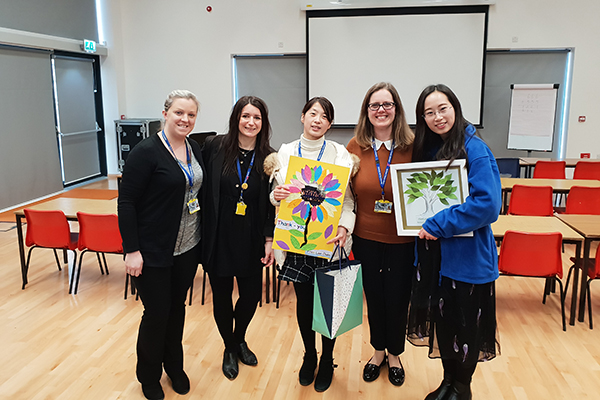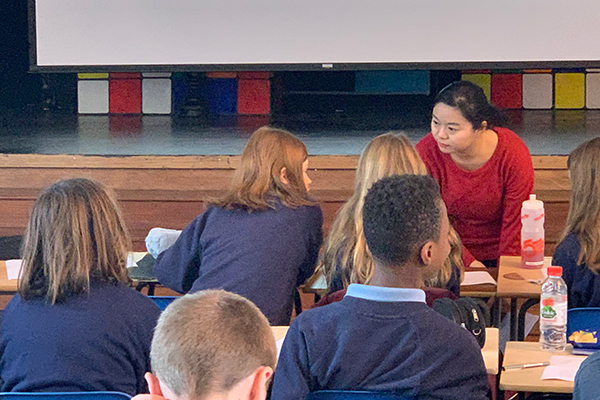Gleaning the best of two worlds


Natalie Pullen (second from left), a British math teacher at the Northern Parade schools in Portsmouth, poses with Shanghai and British math teachers at the school in January. CHINA DAILY
Educators from the UK and China talk about the key learning points from their participation in a math teacher exchange program, Cao Chen reports in Shanghai.
Ian Pegrum's understanding of the role of Chinese pedagogy in mathematics used to be limited to what he had heard from others-that it was based on rote learning which offered little room for creativity.
But after undergoing a two-week China-UK math teacher program that was jointly launched by both countries in 2014, the 33-year-old Grade 2 teacher at the William Bellamy Primary School in Dagenham, Essex, has concluded that the Chinese pedagogy is nothing like what it is often described as.
In fact, he has even described it as being "a carefully-crafted learning journey".
"Children in Shanghai actually have plenty of opportunities to express their creativity through problem-solving activities," says Pegrum, who has been teaching for nine years.
"Contrary to perceptions that the Chinese style is very rigid, there is also much discussion in the classroom about the merits of different solutions to problems."
Pegrum was one of the UK teachers who got to observe math lessons at the Shanghai Huangpu District First Central Primary School and Pudong New Area New World Experimental Primary School for two weeks in 2018.
As of February 2019, about 700 teachers in primary and secondary schools from both countries have taken part in the program, according to its organizers in Shanghai. The exchange program also sees Shanghai math teachers visit British primary and secondary schools throughout the UK. All the Shanghai teachers involved in the program are highly experienced and are required to undergo a weeklong training session before they arrive in the UK.

Qian Ying, a math teacher at the Qiyi High School affiliated to Tongji University, answers questions raised by Grade 7 students at the Impington Village College near Cambridge on Jan 18. CHINA DAILY
Only those aged below 45 years old with at least three years of math teaching experience at primary or secondary schools in Shanghai are eligible, according to Huang Xingfeng, the program organizer in Shanghai. All these teachers also hold College English Test Band 6 certificates.
"During the training, teachers review Shanghai basic math teaching theories and approaches to better illustrate the Shanghai style, both theoretically and practically, to British teachers," says Huang, who is also an associate professor at the Research Institute for International and Comparative Education at Shanghai Normal University.
In addition, Chinese teachers with experience of UK schools inform teachers back in Shanghai about the school culture in the UK, education theories and principles, the types of teaching materials used, and the characteristics of British students.
The teaching content that Shanghai educators will use in British classrooms during the exchange is also adjusted to UK standards and culture.
For example, the units of currency in math questions are changed from the yuan, jiao and fen to the pound and penny. The multiplication tables that every Chinese pupil has to master are also translated into English. Even the cuisine that is found in Chinese math textbooks, such as Yangzhou fried rice and Shanghai steamed buns, is localized to include British foods like fish and chips, pies and tea.
MOST POPULAR
- 1 China to give visa-free treatment to another 9 countries
- 2 China fully opens manufacturing sector to foreign investors in landmark opening up move
- 3 China's import expo attracts record-breaking participating countries, exhibitors
- 4 China's door opening even wider to foreign visitors, businesses
- 5 China revises rules to ease foreign strategic investment in listed firms
Editors' Picks
 Video:
Peru sees new port open
Video:
Peru sees new port open
 Infographic:
China's public holidays for 2025
Infographic:
China's public holidays for 2025
 Infographic:
Basic facts of APEC
Infographic:
Basic facts of APEC
 Infographic:
Wrapping up the 7th CIIE: Data recap
Infographic:
Wrapping up the 7th CIIE: Data recap



